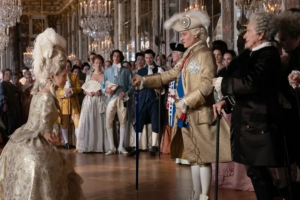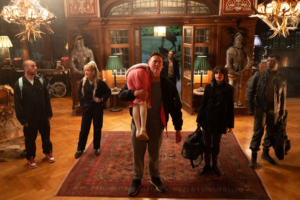Reviewed by GREG KING
Director: Kevin Smith
Stars: Michael Parks, Justin Long, Haley Joel Osment, Genesis Rodriguez, Johnny Depp.
Kevin Smith burst onto the scene in 1994 with his low budget slacker comedy Clerks, which was shot in the convenience store where he worked, which went on to be come a cult favourite. Since then though his subsequent output has been pretty much hit and miss. Chasing Amy and the raunchy Zack And Miro Make A Porno have been hits, while the romcom Jersey Girl was one of the misses. And the awful odd couple cop buddy comedy Cop Out was aptly named. The hostage thriller Red State was tonally uneven, mixing some black humour with some extreme violence.
And for his latest film, Smith ventures into the body modification horror sub genre with the ultra low budget Tusk, and the result is an uncomfortable and totally bizarre mix of horror, gore and black humour that proves to be the year’s biggest wtf film. However, Tusk will not be everyone’s cup of tea.
If you were turned off by The Human Centipede and its disturbing and repulsive sequel then it’s probably best you give Tusk a miss. In this bizarre and truly off beat film, a man obsessed with walruses tries to turn a man into a walrus through surgery. This bizarre film, supposedly based on an urban legend, is the first in a proposed True North trilogy that Smith is planning. It has its genesis in the regular Smodcast podcasts he co-hosts with regular collaborator Scott Mosier in which he read an advertisement from a man who wanted someone to listen to his tall tales while dressed in a walrus suit.
But its look and tone has also been heavily influenced by Frankenstein and films like Stuart Gordon’s 1985 cult favourite Re-Animator and its ilk.
Wallace (Justin Long, cast largely against type) co-hosts a popular weekly podcast along with his friend Teddy (Haley Joel Osment) in which he ridicules people for their failures and quirks. He is the sort of instantly unlikeable, arrogant, cynical and smarmy smart arse who deserves some sort of comeuppance, but even he doesn’t deserve the fate served up to him here.
When Wallace receives a video of a young Canadian who cuts off his own leg while trying to reenact a scene from Kill Bill he heads off to interview him for the next podcast. When he arrives in Canada though the unfortunate young man has died. Wallace is sure that his trip has been a waste of time until he stumbles upon an intriguing note pinned on the wall of a bar toilet.
The note purports to be written by a man named Howard Howe, a veteran seafarer who promises that he has plenty of interesting stories to tell in exchange for a bit of company. Wallace is intrigued and sets out to track down Howard in the backwaters of Bifrost, Manitoba.
Eventually he meets the wheelchair bound Howard (played by Michael Parks, from cult favourites like Kill Bill, Red State, etc), a seemingly benign and charming man who regales him with stories about meeting the likes of Hemingway. He also tells of how he was once shipwrecked and saved by a walrus whom he named Mr Tusk. At that point Wallace passes out thanks to a drugged drink.
When he awakes, Wallace finds himself trapped in a nightmare. Howard intends to turn him into a walrus via some surgical amputations and implants. Wallace is not the first such victim of Howard’s obsession as it soon becomes clear he has been preying on other lonely travelers and curious visitors.
When they haven’t heard from Wallace in a while, Teddy and his concerned girlfriend Allison (newcomer Genesis Rodriguez) journey up to Canada to try and track him down.
The initial discussion between Wallace and Howard over polite drinks is tinged with a modicum of suspense and a growing sense of unease, but the film soon descends into more ludicrous territory when Howard starts his surgery. However, the prosthetic makeup and special effects makeup from veteran Robert Kurtzman (Predator, Goldmember, Texas Chainsaw 3D, etc) that help transform Wallace into a scarred hybrid human walrus are pretty ordinary and almost laughable. The scene in which Howard teaches Wallace how to behave like a walrus and how to swim are truly creepy.
Smith is reunited with Parks, who played the messianic preacher and cult leader in Red State, and is perfectly cast here in a role as a grizzled ancient mariner that seems tailor made for him. Parks’ career has mainly been built around playing eccentric and dangerously unhinged characters (including many small roles in the films of Tarantino), and he seems to be in his element here with a scenery chewing performance as Howard. By turn charming and charismatic and articulate, he is also sinister, dangerously demented, casually sadistic and quite possibly insane. But it is difficult to take your eyes off him as he dominates the screen. His performance makes Howard a more complex villain rather than an outright monster.
 This is a rather demanding performance from Long; there are many touches of his usual screen persona in the early scenes, but by the end he is forced to rely only on his facial expressions to convey emotion and his sense of horror at the transformation his character has undergone.
This is a rather demanding performance from Long; there are many touches of his usual screen persona in the early scenes, but by the end he is forced to rely only on his facial expressions to convey emotion and his sense of horror at the transformation his character has undergone.
We haven’t seen much of Osment on screen lately as he has been a staple of video games and straight to DVD releases, and he also gave away acting for a while to study. And the slightly chubby and bearded Teddy is barely recognisable as the former child actor who burst into our consciousness as the young child who saw dead people in The Sixth Sense.
And there is a special appearance from Johnny Depp, buried under layers of makeup, who plays the suave Canadian police inspector Guy Lapointe, who is investigating a series of mysterious disappearances, and he agrees to help Teddy and Ally track down their missing friend. Depp is credited as Guy Lapointe, and his appearance is just one of the film’s surprises, although his quirky performance here carries the trademark mannerisms of some of his more bizarre screen characters.
Smith revels in his sly in-jokes, his clever literary references, the smart movie references and pop cultural references he throws into the mix. Tusk is disturbing and unsettling and grotesque and blackly comical, and very different from nearly everything else Smith has done, but it is also perversely entertaining for much of the time. And yes, it does feature that song from Fleetwood Mac rather than the Beatles’ I Am The Walrus, which may have been a bit too ironic, even for Smith.
★★★




